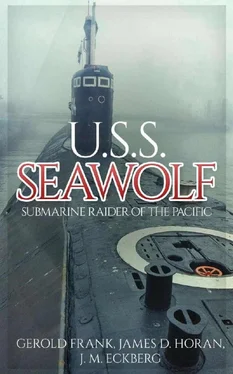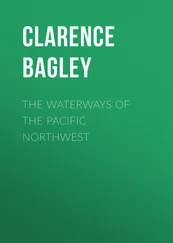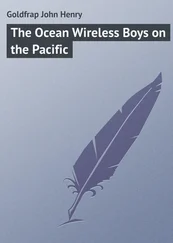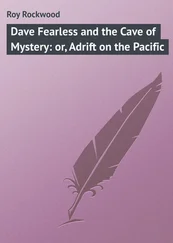On the third day, as we were patrolling, Lieutenant Syverson, conning officer at the time, picked up a target. The call went down for Captain Warder, and the Skipper took over.
The intercom chattered: “She has a two-stick mast… high bridge… single-stacker… Range, about 8,000. Looks like a converted passenger liner… She’s certainly traveling… Probably headed for Balikpapan.”
This made her a doubly valuable target. We knew from information given us that the Dutch had virtually destroyed Balikpapan, on the southwest coast of Borneo, fabulous for the rich-ness and quantity of its oil. But we knew, too, that the Japs were trying desperately to put the wells back into condition. It was up to us to stop this Jap from getting to Borneo.
I picked up the target. Her course was normal. The order came to fire. We fired.
Seconds ticked by… a minute now. No explosion yet.
“I can see both of them,” said Captain Warder’s voice. “They’re missing ahead. Now she’s seen them… Here she is, boys… coming right for us… Looks scared as hell, too… Take ’er down… Rig for depth charge.”
While I kept singing bearings out to him, I was wondering what in the hell had happened. Just what was wrong? We waited, silent. But the ship never dropped a charge.
“She’s running away,” I called out.
The Skipper upped the periscope. “Damn!” he said. “There the bastard goes, heading right back to the barn. He knows damn well I can’t follow him. Secure battle stations. Secure depth-charge stations.”
Now things were quiet. Had we picked up a new jinx? There was nothing to do but lump it. I wandered into Kelly’s Pool Hall and found Eddie Sousa. He felt like cribbage. We sat down and started to play and we hadn’t been playing more than ten minutes when we heard the distant, muffled thump of a depth charge. I started to get up, but Sousa said, “Oh, hell. They’re a long way off. Let’s finish the game.”
We finished it and started a second. When a second charge went off Sousa fanned out his cards and said, “Probably sent out a plane to heckle us.”
I said: “Could be, Eddie, but I better get back up with Paul.”
Sousa began shouting: “Damn you, Eckberg, you know I’m ready to skunk you.” He looked so hurt and indignant I couldn’t help laughing at him.
He chased me out of the room, yelling: “Come on back here, you yellow dog, and finish this game and get skunked!”
Paul, who’d heard some of it, grinned when I came in. “Someday Sousa will handcuff you to a chair and make you finish that game,” he said.
After hearing the charges hit the water, I decided Sousa was right. An airplane had spotted us, dropped a few aerial bombs, and disappeared.
Sousa came in the sound shack and began to complain bitterly to Maley how I walked out on his winning game. Every time he would begin, I would raise my hand and say: “ Shhhhhhh , I hear something.” This drove Eddie into a frenzy. He wrung his hands and called me every name under the sun. For days afterward he alternately threatened and cajoled me to finish that game. We still have to finish it.
Sometime during the night we heard over the radio the Nazis had been stopped cold in Russia, and that the Marines were pushing the Japs back on Guadalcanal. Over the radio came word that several of our submarines were working out there in the Solomon Islands invasion.
Maley commented on this. “I’m glad we’re not Marines,” he said. “Think of crawling on your belly in the jungle waiting for a Jap to take a shot at you. What a life!”
As we were about to surface that night, Captain Warder spotted a large sampan. He told Lieutenant Deragon: “I think I’ll look this fellow over. He may be a Nip with a radio transmitter and receiver. If he is, we’ll shoot him up.”
We surfaced silently and crept up on him. We had not been on the surface over five minutes before Gunner Bennett was down in the control room opening the gun locker and breaking out small arms and some machine guns. We were not going in close without being set for a surprise. Everybody wanted to get a chance to shoot some Japs, but the men who were to do that shooting, if it came to that, were already at their stations.
The Captain maneuvered carefully. No talking was permitted on the bridge. We used our motors. There wasn’t a sound of any kind. The Captain kept his glasses on the sampan constantly. We were taking no chances, and the ship was in a crash-dive condition.
I don’t believe the sampan knew we were about until we were less than thirty yards from her. The Captain looked the sampan over, bow to stern and back, looking for telltale antennae, any signs of gun mounts—there was nothing. After a few minutes, he said: “It’s harmless. The only ones on board are a man, his wife, and two small children.”
Gunner Bennett collected the guns. We were all disappointed. We wanted a crack at the Japs at close hand.
We charged batteries and dove shortly before dawn and headed for another enemy port. Twelve hours later we reached our patrol point outside the harbor. In seizing this port, the Japs won one of the most valuable prizes of the war.
Before the Dutch moved on, they put the torch to the entire city. Refineries, cracking plants, millions of dollars’ worth of re-search laboratories went up in acrid smoke. Most of the foreign population had fled to Java, or vanished into the jungle. Somewhere in that jungle the Allies had a secret airport of which they made excellent use against Jap shipping in the early part of the war.
Even the workers battled the Japanese invaders. We learned later that employees dumped thousands of barrels of oil into the river to stop the Japs, setting fire to it, but a sudden cloudburst put out the flames.
The Japs were using the harbor for all it was worth, running oil up to the homeland in anything that would float. Three hundred miles up the coast they had seized Tarakan, too, but only after the Dutch had destroyed the oil refineries, which used to produce nearly one million tons a year.
Our first day on patrol was quiet. We cruised in deep water.
But at dawn of the second day the Skipper decided to go inside the harbor. It was a ticklish business, for the Japs had mined it, and we knew the water wasn’t too deep. We couldn’t afford to make a mistake.
We went in. We went deeper and deeper. The water grew dangerously shallow. The Skipper had his eye glued to the periscope, scanning the beach installations.
“Battle stations!” he ordered suddenly. “Make ready the forward tubes.”
The entire boat churned into action. The control party scrambled up the ladder.
“It’s a sub chaser.” Captain Warder’s words were measured.
“I don’t know if he saw us. I won’t attack unless he does. He’s small and making high speed.”
This was plenty bad. We were in shallow water. We had nowhere to hide. If he attacked, he could blast us to bits. If he knew we were there, he would attack. It was as simple as that. I listened to the screws, and the thumping of my heart was so loud and strong it seemed to shake me from head to toe. The Japs’ screws were faint, then louder, then still louder. Maley pressed his phones against his ears. There wasn’t a whisper in the boat. I scarcely recognized my own voice as I gave the bearings: “Three two zero… three two two… three two four.”
All sorts of things flew through my mind. I was convinced the Jap would pass close to us, but the pattern of his bearings indicated that he would pass well forward on our bow unless he changed his course radically. But in the back of my mind I knew a plane might have been working with the subchaser, must have spotted us, and put the subchaser on our tail. I found my fist beating the desk in time with the beating screws. Louder… louder… up the bow—up the bow— and past us, a good 600 yards away, at high speed.
Читать дальше






![Hubert Bancroft - The Native Races [of the Pacific states], Volume 5, Primitive History](/books/749157/hubert-bancroft-the-native-races-of-the-pacific-s-thumb.webp)

![Hubert Bancroft - The Native Races [of the Pacific states], Volume 1, Wild Tribes](/books/750126/hubert-bancroft-the-native-races-of-the-pacific-s-thumb.webp)



![Edward Ellis - Adrift on the Pacific - A Boys [sic] Story of the Sea and its Perils](/books/753342/edward-ellis-adrift-on-the-pacific-a-boys-sic-s-thumb.webp)